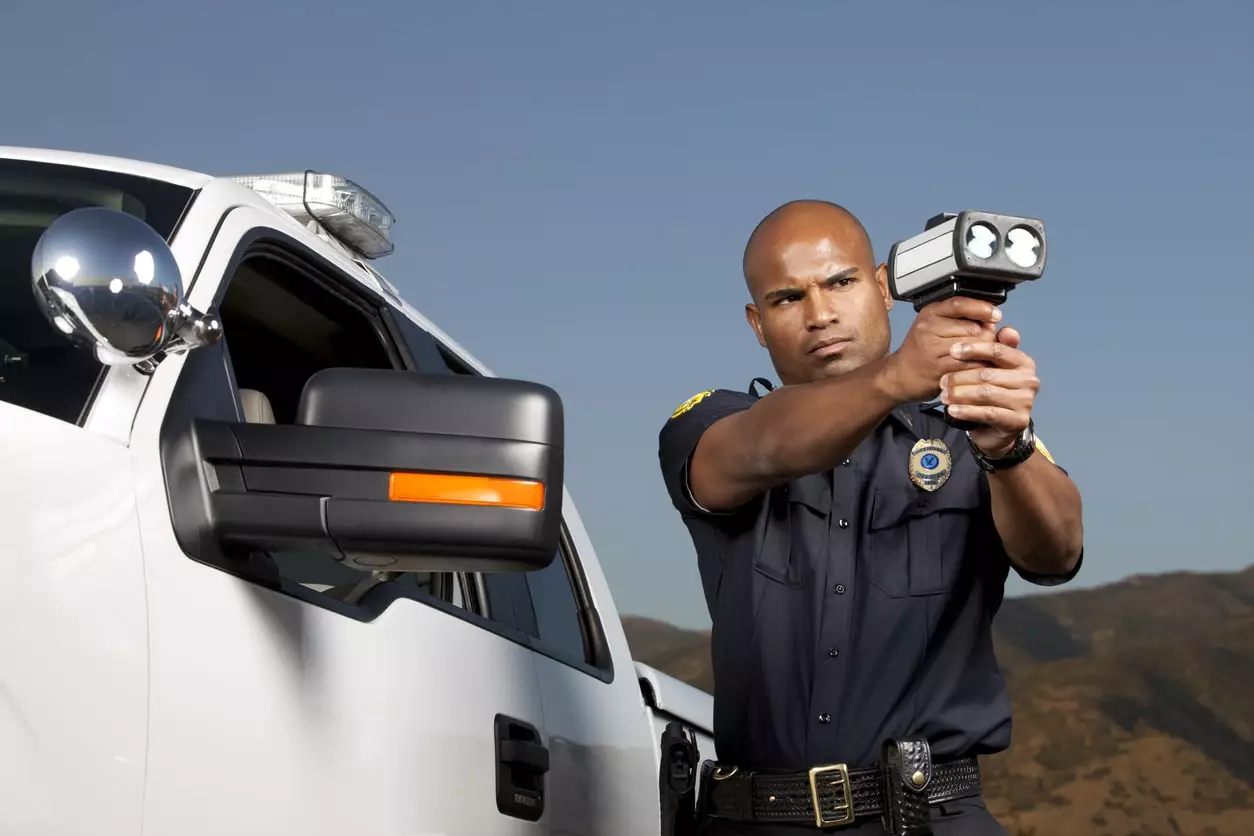 What Is a License Plate Reader and Can Police Track You Using It?
What Is a License Plate Reader and Can Police Track You Using It?
Table of Contents
- Indiana License Plate
- Indiana License Plate Design and Formats
- Indiana Vanity License Plate
- Most Popular Indiana Special Plate Numbers
- Indiana License Plate Lookup
- What Do I Need to Get a License Plate in Indiana?
- Differences Between a Passenger License Plate and Commercial License Plate in Indiana
- How To Renew License Plate in Indiana
- How To Transfer a License Plate in Indiana
- Indiana License Plate Lookup Frequently Asked Questions (FAQ)
 Indiana License Plate
Indiana License Plate
A license plate is a metal plate containing a series of alphabets and numbers serving as official identification for the vehicle to which it is attached. In Indiana, license plates are required for commercial motor vehicles, passenger vehicles, semi-trailers, trailers, and motorcycles, and it is illegal to operate a motor vehicle on a public road without a license plate. Per IC 9-18-2, every vehicle, including commercial vehicles and recreational vehicles, that will be operated in Indiana must be registered and obtain license plates. According to state law, anyone who registers a vehicle shall receive a sticker, license plate, or other proof of registration. Standard license plates in Indiana have alphanumeric characters as plate numbers and contain a number of stickers denoting some essential information.
The Indiana Bureau of Motor Vehicles (BMV) issues a variety of license plate categories, many of which can be personalized. They include:
- Standard License Plates - These are primarily issued for passenger vehicles and may be placed on trucks with a declared gross weight of 11,000 lbs maximum if personalized
- Organization License Plates - These are obtained to show support for special interest groups or demonstrate organizational affiliation. They can be issued to passenger motor vehicles, motorcycles, recreational vehicles, and trucks with a gross weight of not more than 11,000 lbs
- Military License Plates - Military plates are issued to eligible persons in recognition of their military achievements. Passenger vehicles, recreational vehicles, motorcycles, and trucks whose weights are not more than 11,000 lbs qualify to have military license plates in Indiana
- Personalized License Plates - These license plates contain messages or characters preferred and specifically requested by their owners. They can be issued to motorcycles, passenger vehicles, trucks (with no more than 11,000 lbs weight), and recreational vehicles
- College and University License Plates - These license plates recognize colleges and universities in Indiana and can be issued for recreational vehicles, motorcycles, trucks weighing a maximum of 11,000 lbs, and passenger vehicles
- Special Machinery License Plates - These are issued for vehicles on which machinery or equipment are permanently mounted for operations or functions unrelated to transporting people or property on a highway
- Fleet Vehicle License Plates - These are issued in the fleet vehicle registration program for Indiana residents who own or lease at least 1,000 passenger vehicles or trucks weighing not more than 11,000 lbs
The BMV provides a list of all licensed plates issued under the broad categories of plates in Indiana. License plates must be securely fastened in a horizontal position to the vehicle on which they are issued to prevent them from swinging. Indiana is a one-plate state and only requires one license plate per car. Per IC 9-18-2-26, trailers, motorcycles, semi-trailers, motor-driven cycles, and recreational vehicles must have their license plates on the rear. Tractors, dump trucks, trucks with rear-mounted forklifts, and every other vehicle must have their plates fastened on the front. Indiana license plates must be affixed at least 12 inches from the ground (measuring from the bottom of the plates) in a clearly visible position. They must not be obstructed by bumper, tires, or other accessories.
 Indiana License Plate Design and Formats
Indiana License Plate Design and Formats
While there are several arrangements to the characters on Indiana license plates depending on the plate type, a standard license plate in the state contains three numbers followed by between one and three random letters. These characters are inscribed on plates with a white-on-blue torch background. A standard license plate in Indiana should have three stickers and the state's name in upper case on the top. The first one is in the top left-hand corner, indicating the month and day a vehicle's registration expires and must be renewed. The second sticker is located in the top right-hand corner, showing the year a vehicle's registration will expire and must be renewed. The third one is in the bottom right-hand corner, displaying the county (represented by county numbers).
Indiana's distinctive license plates (plates other than a standard passenger plate) have the basic features of standard license plates with additional components. For instance, they may have the logos of institutions, groups, or special interests they represent on the left-hand side before the first character in the plate number.
Standard License Plate
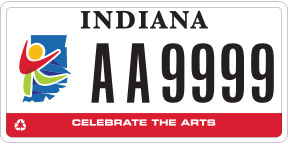
Distinctive License Plates
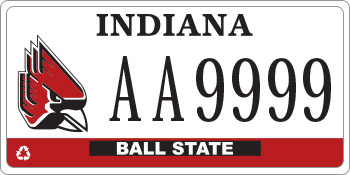
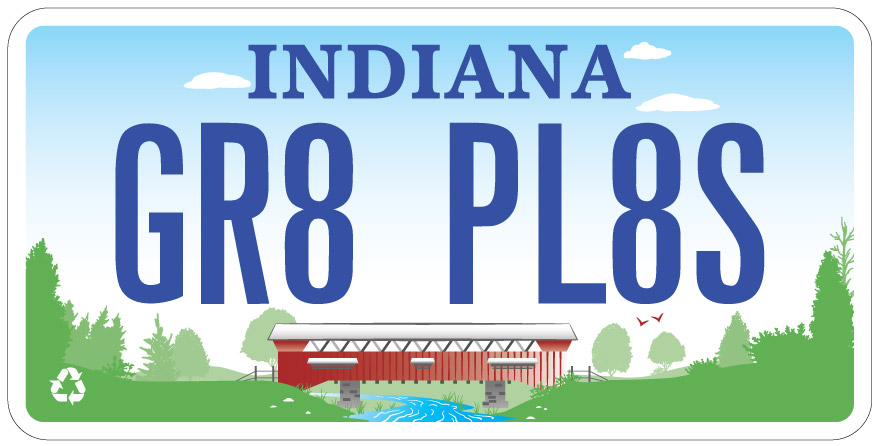
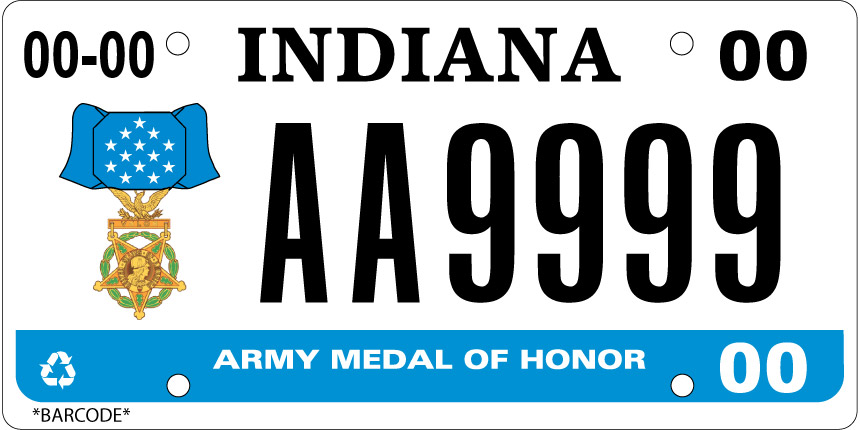
Personalized License Plate
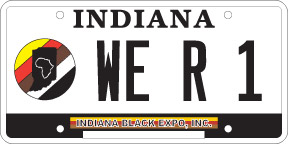
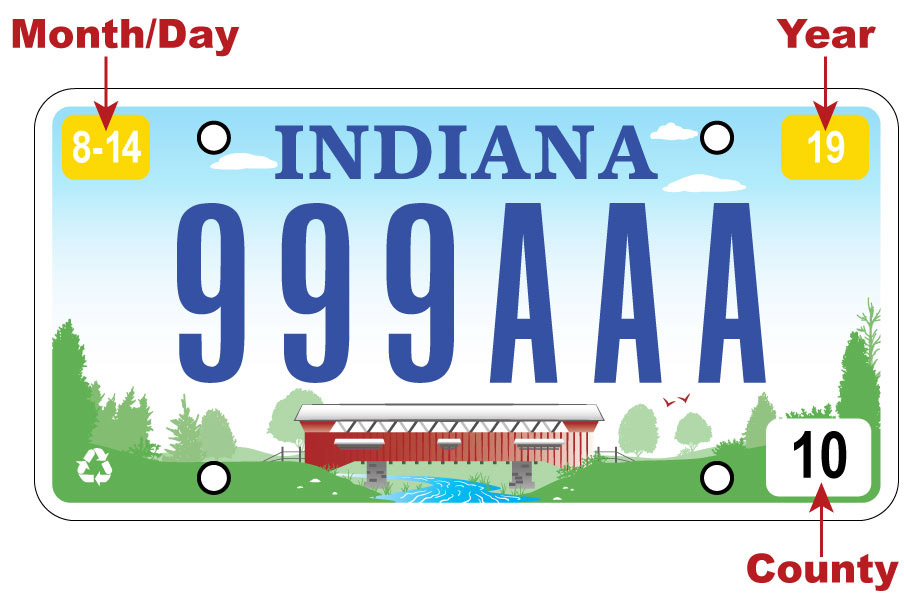
 Indiana Vanity License Plate
Indiana Vanity License Plate
Vanity license plates are known as personalized license plates (PLPs) in Indiana. These are plates bearing plate numbers (a combination of numbers or letters) requested by vehicle owners. A personalized or vanity license plate number or message in Indiana must contain at least two characters and may only have a combination of letters (A - Z) and numbers (0 - 9). The message cannot contain only numerals. While it cannot contain special characters, the message may contain spaces between any combination of letters and numbers, but more than one successive space is not permitted. Several other license plate types in Indiana can be personalized. The maximum number of characters allowed on PLPs on standard Indiana license plates is eight for passenger vehicles and six for motorcycles. For all other distinctive license plates, it is a maximum of six for passenger vehicles and five for motorcycles.
You can order a personalized license plate in Indiana in three ways. The first is through online services on myBMV portal. This requires creating an account if you do not already have one. Indiana vanity license plates can also be ordered at any Bureau of Motor Vehicles branch (BMV branch) or on a BMV Connect Kiosk. BMV Connect kiosks are self-service terminals and are available 24/7 for multiple BMV transactions, including ordering Indiana vanity license plates.
Generally, the availability of a personalized license plate message in the state is on a first-come, first-served. The BMV will only approve it if available. Your request for a PLP message may be denied if it is misleading, bears offensive or indecent meaning, or if the BMV considers it otherwise improper for issuance. You can use the PLP Quick Reference Guide to check the availability of your preferred message. Alternatively, you can use the myBMV portal to determine that your preferred message is not already in use. Your personalized license plate will be sent to you by mail within 30 days of submitting your request if the BMV approves it.
If you want to keep your PLP message, you must register it annually. Otherwise, it may become available to another individual if more than one year has passed since the last plate registration expires. Excluding state and local excise taxes, it costs $45 to obtain a personalized license plate in Indiana.
 Most Popular Indiana Special Plate Numbers
Most Popular Indiana Special Plate Numbers
Some of the most popular special (distinctive) license plates in Indiana are listed below:
- Army Medal of Honor license plate
- American Legion license plate
- University of Indianapolis license plate
- Indiana State University license plate
- Gold Star Family license plate
- National Guard license plate
- Purple Heart license plate
- Pearl Harbor Survivor license plate
- Special Olympics license plate
 Indiana License Plate Lookup
Indiana License Plate Lookup
A license plate lookup in Indiana is a service that permits individuals to check certain information on any vehicle registered in the state using the vehicle's license plate number. It typically involves searching for data related to a specific license plate number. While law enforcement agents in Indiana use license plate lookups for various legitimate purposes, residents also have several reasons to search license plates. For instance, when looking to buy a used car and wish to get more information about it, a license plate lookup should be the first thing to do. License plate lookup can also be used in court proceedings in a civil matter involving a vehicle.
While a license plate lookup can reveal information about a vehicle and its owner, you need a valid reason to find the plate owner's identifying information, regardless of the reason you are searching the plate. The Federal Driver's Privacy Protection Act (DPPA) prohibits disclosing personal information in vehicle records for unauthorized purposes and to unauthorized persons or entities. As a result, it is illegal to search the name, address, or other contact information of the person registered to a license plate number in Indiana unless you are legally authorized. A license plate lookup in the state may provide the following information about a vehicle:
- Registration history
- Inspection and service history
- The vehicle's make and model
- Recalls history
- Accident history
- The vehicle's lien and possession records
- Mileage
- Information on whether the vehicle is subject to a mileage rollback waiver
- Natural damage history, such as hail, fire, or flood damage
- Stolen vehicle alerts
You can look up an Indiana-registered vehicle's information on the BMV's Vehicle Registration Record Search. However, you must first register an account; this will give you basic access to the BMV records at a fee. The state's BMV does not offer free license lookup services. As a Basic Access-only account owner, you cannot access personal information in BMV records. Only authorized individuals and entities with Enhanced Access are granted access to comprehensive information while looking up the BMV records for license plates. Alternatively, Recordsfinder provides reliable license plate lookup services in Indiana. With an Indiana license plate number, you can retrieve a vehicle's basic information, such as the make, model, year of manufacture, and sale history, on Recordsfinder.
Indiana Reverse License Plate Number Search
A reverse license plate number search in Indiana allows a person to look up information about the vehicle associated with a license plate using the full license plate number. Generally, reverse license plate lookup pulls information from several depositories/organizations to provide one comprehensive report about a vehicle based on the information linked to the vehicle's license plate number.
If you have a DPPA-allowable reason to conduct a reverse license plate search on any Indiana license plate and are authorized to do so, you can use Recordsfinder. Note that your request will not be processed if your reason for performing a reverse license plate number search contradicts the DPPA requirements.
 What Do I Need to Get a License Plate in Indiana?
What Do I Need to Get a License Plate in Indiana?
Newly purchased or acquired vehicles in Indiana must be registered, and owners must obtain state-issued license plates. Residents must register all unregistered, newly acquired vehicles within 45 days of purchasing or acquiring them. Similarly, anyone relocating from out-of-state to Indiana must apply for vehicle registration within 60 days of attaining a resident status. The state's Bureau of Motor Vehicles provides vehicle owners with four options for vehicle registration. A vehicle registration may be completed at any BMV branch, online at myBMV.com, BMV Connect Kiosks, or any Full-Service Provide/Partial-Service Provider (FSP/PSP) location.
The following are required for vehicle registration in Indiana:
- Proof of residency in the state
- Indiana driver's license
- A completed State Form 205 (Application for Certificate of Title Form)
- Original vehicle title
- Social security number
- A completed State Form 43230 (Odometer Disclosure Statement Form) if the vehicle's odometer information is not on the certificate title
- Evidence of Indiana vehicle insurance
- State Form 39530 (Physical Inspection Form) for residents who recently relocated to Indiana and whose vehicle has never had an Indiana title or for vehicles whose VIN plates are not easily accessible
- Proof of emission test (for vehicles in Lake and Porter Counties)
You can access additional forms as may be required by the BMV from the Title Forms Page, depending on the peculiarity of your situation. To apply for your vehicle registration and obtain an Indiana license plate, submit all the required documents to the BMV using any of the approved application methods and pay all necessary fees, including the vehicle registration fee and plating fee. You can contact the BMV for additional information on Indiana vehicle registrations and license plate registrations by electronic mail.
 Differences Between a Passenger License Plate and Commercial License Plate in Indiana
Differences Between a Passenger License Plate and Commercial License Plate in Indiana
Passenger license plates are primarily issued for passenger vehicles, while commercial license plates are given to vehicles used or registered for commercial purposes by individuals or businesses. In Indiana, a motor vehicle is considered a commercial vehicle by its usage and gross vehicle rating. The following are the major differences with passenger license plates and commercial license plates in the state:
| Criteria | Passenger License Plate | Commercial Vehicle Plate |
|---|---|---|
| Vehicle Type | Vehicles designed for carrying passengers, including buses, motorcycles, snowmobiles, motor-driven cycle, and off-road vehicles | Vehicles used in commerce to transport property or passengers with a gross combination weight rating or gross combination weight of 26,001 lbs or more, whichever is greater, inclusive of a towed unit with a gross vehicle weight of more than 10,000 lbs. They include trailers, for-hire buses, trucks, and tractors used with semi-trailers |
| Registration Agency | The BMV | The BMV, but where a company has at least 25 commercial vehicles weighing 16,000 or more, base plate registration (BPR) is handled by the Indiana Department of Revenue's (DOR) Motor Carrier Services Department |
There are no significant differences between the requirements for obtaining an Indiana passenger license plate and a commercial license plate.
 How To Renew License Plate in Indiana
How To Renew License Plate in Indiana
Vehicle owners in Indiana must renew their vehicle registrations or license plates annually with the state's Bureau of Motor Vehicles (BMV). Typically, the BMV mails notice of expiration to vehicle owners a few weeks before their current registrations expire. The notice will contain information such as the due date, how to renew a license plate/vehicle registration, and emissions test requirements (only Lake and Porter Counties need emissions tests for vehicles older than 4 years). Generally, a vehicle's Indiana license plate expires the same day every year, and the date is based on a vehicle owner's last name.
You need proof of car insurance, two proofs of address, and a renewal notice or current vehicle registration for an Indiana license plate renewal. Renewals may be completed in any of the following ways:
- At any BMV Connect Kiosk
- Online at myBMV.com (this excludes heavy-weighted motor vehicles over 26,000 lbs and other vehicles that need additional forms for vehicle registration renewals)
- Over the phone at (888) 692-6841 (Not for special group recognition plates, heavy-weighted motor vehicles over 26,000 lbs, or any other vehicles that require additional forms for renewal). During the call, vehicle owners must provide the zip code for the vehicle whose registration/license plate is being renewed and the phone access code. The phone access code is listed on the renewal notice or on a person's myBMV account
- In-person at any BMV branch
- At any FSP/PSP location
- By mailing the renewal notice and payment to the BMV at:
P.O. Box 100
309 West South St
Winchester, IN 47394
Failure to renew a vehicle registration in Indiana before the scheduled expiration date attracts a $15 administrative penalty. It may take up to three weeks for the BMV to process a vehicle registration renewal.
 How To Transfer a License Plate in Indiana
How To Transfer a License Plate in Indiana
In Indiana, you can transfer a license plate from an old vehicle you still own or have disposed of to a newly acquired/purchased vehicle. Typically, you can visit a BMV branch to transfer virtually all kinds of license plates issued in the state. While Indiana allows vehicle owners to transfer license plates online at myBMV.com, note that there may be certain scenarios where processing license plate transfers online will be impossible, and you would be required to visit a BMV branch. Generally, Indiana license plates like motorcycle plates, passenger plates, In God We Trust plates, and truck plates (for trucks weighing 11,000 lbs or less) can be transferred online at myBMV.com.
 Indiana License Plate Lookup Frequently Asked Questions (FAQ)
Indiana License Plate Lookup Frequently Asked Questions (FAQ)
Can I Get a Replacement for My Lost License Plate in Indiana?
Yes, Section 9-18.1-11-8(a)(2b) of the Indiana Code makes provisions for replacement license plates for lost plates in the state. The first thing to do when your license plate is lost is to report it to law enforcement. It is not mandatory to report it as stolen if you are unsure whether it was stolen or just lost. When you request a replacement plate, the BMV will issue a new plate number but the same license plate type. You must visit a BMV branch in person to request a replacement Indiana license plate. Obtaining a replacement license plate from the BMV will cost you $9.50.
What Do Police See When They Run Your License Plates in Indiana?
Police and other law enforcement officers see various information when they run Indiana license plates through an electronic verification system, including the following:
- Outstanding violations
- Vehicle registration status
- Information about vehicle registered owners, such as their names, dates of birth, gender, and address
- Stolen car alerts for vehicles registered or listed as stolen
- The make, model, and color of the vehicle
- Vehicle insurance status
- If the license plates match the vehicles on which they are attached
While a random individual cannot access some of this information, like personal identifying details, by looking up license plates, law enforcement agencies are authorized to see them.
What is the Penalty for Driving with An Expired License Plate in Indiana?
Vehicle registrations in Indiana are only valid for one year after the first issuance and must be renewed annually to keep them active. An expired vehicle registration in the state implies an expired license plate. According to state law, driving a vehicle with an expired license plate is a Class C infraction, which attracts a fine of about $150. The state strictly prohibits operating a motor vehicle with an expired plate. If you violate this law, your vehicle may be towed and impounded by the relevant authorities until you renew your vehicle registration and, by extension, license plate.
An Indiana temporary registration permit is only valid for 30 days beginning from the day it is issued. If you obtain a temporary registration permit for any reason permitted by state law, it is important to acquire a permanent registration before the temporary permit expires. Otherwise, the penalties for operating a vehicle with an expired vehicle registration in Indiana may kick in.
Do I Need to Return License Plates in Indiana?
No state law requires vehicle owners to return their Indiana license plates when selling their vehicles or relocating permanently to another state. If you sell a vehicle, you can transfer the license plate on the sold vehicle to another car owned by you. Similarly, you are not mandated to update the BMV or return your license plate when moving out of state. However, you must obtain a new license plate upon arrival in the new state and after establishing residency.
Can I Keep my Indiana License Plate if I Move to Another State?
Yes. While you may opt to surrender your Indiana license plate when you move permanently to another state, it is not legally required. In fact, there are no penalties for not informing the state's Bureau of Motor Vehicle (BMV) if you are relocating out of state. Your Indiana license plate will be canceled as soon as you obtain a new vehicle registration and acquire a new license plate in the new state.
What Size are License Plates in Indiana?
Although the BMV offers various license plate designs, all Indiana license plates measure 12" x 6".
How Long Can You Drive with Temporary License Plates in Indiana?
You have a maximum of 30 days to drive a vehicle legally with an Indiana temporary registration permit (temporary license plate). To avoid issues with law enforcement, ensure that you keep this permit in your vehicle for the period it is valid. In Indiana, you may need a 30-day temporary registration permit in any of the following situations:
- You are an Indiana resident who intends to relocate to another state, and your current vehicle registration or temporary permit will expire before you move
- You purchased a vehicle in Indiana but intend to register or title it in another state or country
- You own a vehicle that requires emissions testing, and further mechanical repairs are needed before the vehicle can comply with the state's emissions testing requirements
- You are an Indiana resident, and the vehicle registration in another state has already expired, but you have applied for an Indiana title
Indiana also issues a 96-hour temporary delivery permit for individuals to operate their vehicles without registering or titling them. As the name suggests, this is only valid for 96 hours after issuance. It allows an individual or the person's employee or agent to operate a vehicle for the purpose of delivery to a place of storage or an inspection location for emissions testing. The BMV will not issue a 96-hour temporary delivery permit to any vehicle whose registration has expired and which requires an emissions test for vehicle registration renewal. However, an impounded vehicle with an expired registration may be issued a 96-hour temporary delivery permit if a passed emissions test is needed to renew the vehicle registration.
What Are the Steps to Renew License Plates in Indiana?
You may renew your Indiana license plate with the state's Bureau of Motor Vehicles (BMV) through any of the following methods:
- By mail, which requires mailing your renewal notices and payment to the BMV at Winchester Processing Center, P.O. Box 100, 309 West South St, Winchester, IN 47394
- Online at myBMV.com (for vehicles weighing less than 26,000 lbs and those not requiring additional forms for renewal application)
- At any BMV Connect Kiosk location
- At the nearest BMV branch
- By telephone - Call (888) 692-6841 (This renewal method does not apply to vehicles weighing over 26,000 lbs, those needing additional forms, and all special group license plates
- At any FSP/PSP location
What Do I Do if My License Plate is Lost or Stolen in Indiana?
- Report a lost or stolen license plate in Indiana to the police or any other law enforcement agency
- Make sure law enforcement completes the Report of Stolen License Plate or Registration Decal Form (State Form 37135) for a stolen license plate
- Apply in person for a replacement license plate at any BMV branch. You must present the State Form 37135 (for a case of a stolen license plate) at the time of requesting a replacement license plate and pay a $9.50 license plate replacement fee
 Related Articles
Related Articles
The information on this website is taken from records made available by state and local law enforcement departments, courts, city and town halls, and other public and private sources. You may be shocked by the information found in your search reports. Please search responsibly.
Recordsfinder.com is not a “consumer reporting agency” and does not supply “consumer reports” as those terms are defined by the Fair Credit Reporting Act (FCRA). Pursuant to our Terms of Service and Privacy Policy, you acknowledge and agree not to use any information gathered through Recordsfinder.com for any purpose under the FCRA, including but not limited to evaluating eligibility for personal credit, insurance, employment, or tenancy.
Searches of license plate and VIN information are available only for purposes authorized by the Driver’s Privacy Protection Act of 1994 (DPPA).
By clicking “I Agree” you consent to our Terms of Service, agree not to use the information provided by Recordsfinder.com for any unlawful purposes, and you understand that we cannot confirm that information provided below is accurate or complete.
The search you are about to conduct on this website is a people search to find initial results of the search subject. You understand that any search reports offered from this website will only be generated with the purchase of the report or account registration.



